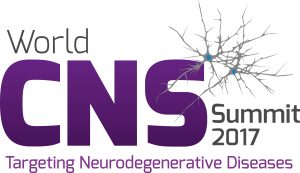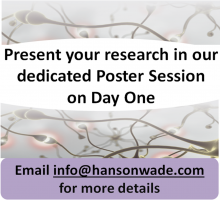Day One
Tuesday 21st February, 2016
Day Two
Wednesday 22nd February, 2016
08.30 Chairman’s Opening Remarks
Strategies Targeting Aβ Tau
08.40 From Biomarkers to Diagnostics: Applications from Target Engagement to Patient Stratification
Synopsis
- Addressing the need for the co-development of biomarkers and drug development
- Exploring perspectives on companion diagnostics in neurodegeneration
09.10 Targeting the Spread of Pathology in Neurodegenerative Diseases
Synopsis
- Elucidating biological triggers in the spread of neurodegeneration
- Highlighting screens for candidate therapeutics must be based around the biological mechanisms involved in spread of pathology
- Exploring in vitro and cell-based screens that model spread of Aâ, tau and synuclein pathology as well as the translation of in vitro screens into animal models
- Identifying novel strategies for targeting the spread of pathology to block the progression of neurodegeneration
09.40 Microtubular Proteins & Cytokines as Peripheral Biomarkers of Disease Progression in Neurodegenerative Disorders: a Novel Path Towards Innovative Pharmacological Interventions?
Synopsis
- Alterations in microtubular proteins and cytokines in neurodegenerative disorders
- Tubulin post-translational modifications and TAU in plasma and CSF: from preclinical models to clinical settings
- Interaction between microtubular proteins and cytokines and possible pharmacological interventions
10.10 Identification of Novel Therapeutic Targets Against Tau Pathology in Disease-Relevant Cellular Models
Synopsis
- Exploring examples of human iPSC-derived neurons to model key mechanisms of tau pathology and their applications to stimulate drug discovery
- Utilizing phenotypic chemical or genetic screens to identify novel targets against tau pathology that have better chance of clinical translatability
- Understanding the interplay between tau, amyloid and ApoE4 to advance the translational development of therapeutic interventions
10.40 Morning Refreshments & Networking
11.20 The Challenges and Potential of Combination Therapies for Alzheimer’s Disease
Synopsis
- Describe the rationale for exploring combination therapies targeting different mechanisms in the AD pathogenic process
- Provide an example of transgenic mouse studies that demonstrate synergistic clearance of existing amyloid plaques by combining treatments targeting different parts of the amyloid cascade.
- Highlight the challenges in developing a robust AD model that recapitulates both amyloid and tau pathologies (and their interaction) to assess combinations targeting both amyloid and tau preclinically.
- Review development and regulatory approaches for combination therapies in Alzheimer’s Disease.
11.50 Breakout Roundtable Discussions
Synopsis
This session will focus on devising solutions that cannot be obtained in presentation format, and will give you actionable takeaways to build a more holistic understanding of the field. Access the critical information that is only obtainable through frank and open discussion around crucial topics in the field. Shape the debate around the following topics:
- The Need for Integrative Disease modeling & Precision Medicine
Ole Isacson, Professor of Neurology and Neuroscience Harvard Medical School - Addressing the Dichotomy Between Disease Modification & Symptomatic Treatments
Brendon Boot, Medical Director, Voyager Therapeutics, Inc. - Achieving Targeted Drug Delivery to the Brain
Gregory Stewart, Consultant, Alchemy Neuroscience - Preclinical and clinical funding strategies to maximize resources for drug discovery and development
- What is the future for Neurodegenerative Therapeutics
Sam Agus Chief Specialist, Medical Affairs, Neurology H. Lundbeck A/S - Is Aβ Tau all its cracked up to be?
Sophie Parmentier- Batteur Director Neuroscience Merck
12.30 Lunch & Networking Driving
Driving Success in the Clinical Landscape
13.30 Computational Analysis & Quantitative Models of Biomarkers to Inform Efficacy & Patient Stratification in Clinical Trials
Synopsis
- Outline the breadth of biomarkers in use and under development across the AD field
- Examine issues related to using biomarkers for patient stratification
- Explore the consequences of not having the right biomarkers
- Examine the virtues and perils of data mining and restricted hypothesis testing
14.00 From Neuro-architectures to Biomarkers: Network from Neuroimaging Dysfunction from Neuroimaging Data & its Relevance for Understanding Neurodegenerative Syndromes
Synopsis
- Exploring a framework to search for more meaningful biomarkers that more accurately capture the mechanisms of the complex organ that is the human brain
- Gaining an insight into network dynamics at macro-scopic (temporal and spatial) scales that are driven by behavioral task demands
- Presenting data from multiple cognitive/behavioural domains (memory, motor and attention) and in healthy and pathological populations
14.30 Panel Discussion: Incorporating New Diagnostic Capabilities to Advance Biomarker Monitoring
Synopsis
- Exploring the known neurophysiological and metabolic bases of currently employed in vivo functional imaging techniques
- How can we maximize the use of neuro and molecular imaging for risk reduction and identification of cognitive symptom onset early on
15.00 Afternoon Refreshments & Networking
Redefining Clinical Trials Through the use of Digital Biomarkers
15.30 The Need for Novel Endpoints in Neuroscience Clinical Trials
Synopsis
- Addressing current success rates in neuroscience drug development which are too low to be sustainable
- Neuroscience clinical trials rely on clinical rating scales which are limited by high variability and low signal detection
- Evaluating modern technologies that hold promise for more direct, more continuous assessment of disease severity and medication effect
- Exploring how integrating novel endpoints could revolutionize drug development in Neuroscience
16.00 Re-wiring Clinical Development in CNS: Biometric Monitoring, Smart & Virtual trials
Synopsis
- Questioning how biometric tech platforms can contribute to clinical development and can ultimately replace the search for accurate surrogate biomarkers?
- Exploring how can we make clinical trials ‘smarter’ as well as identifying what components are needed for trial virtualization
- Addressing whether or not patients are ready
16.30 Harnessing Big Data & Wearable Technology to Advise Clinical Readouts
Synopsis
- Debating big data vs. objective measures for specific conditions
- Evaluating wearable devices consumer vs. medical grade; what should we use and when?
- Understanding the difference between what patients are willing to use and what researchers are looking for





